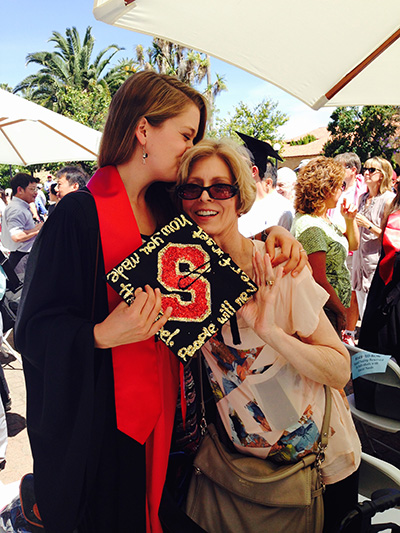My mom loved salads. She made sure my sisters and I ate one every day — no matter how much we resisted. Fresh vegetables were her comfort food and she enthusiastically showed us how deliciously low maintenance they were: no dressing or preparation required.
All this changed my senior year of high school. As with many colorectal cancer patients, my mom lost the ability to process the fiber these vegetables contained, leaving her doubled over in sharp pain for hours. A salad was out of the question.
But, a girl’s got to eat. So her choices became meatier. Deep fried dangers suddenly looked acceptable, and my mother rediscovered french fries. During her first two rounds of chemo, nothing could stir her appetite quite like fries. Crispy, salty, and with a dash of ketchup was the way to go, and I — like many children of cancer patients — learned to how make these french fries in my sleep.
Breakfast? French fries. Lunch? fries. Dinner? Yep, fries again, plus whatever meat we happened to have in the house. Snacks? You guessed it.
Along the way, these once-forbidden fries developed a symbolic meaning for me: Back at college, after fries-soaked breaks at home, fries became my go-to when schoolwork became stressful or deadlines popped out of nowhere or relationships soured.
Related
Then when my mother was suddenly hospitalized, I went for days eating only a few french fries for every meal. When I left class one day with an unexpected message from my dad informing me that her cancer, which had been in remission, had come back with a vengeance, all I could keep down for the next 24 hours was one order of french fries.
When I found out her diagnosis was terminal just two weeks after a she survived a life-threatening surgery, I drove straight to In-N-Out. When she suffered multiple spinal fractures a few weeks before I was set to graduate, fries were there to see me through until that diploma was in my right hand, my left holding my mom’s.
I didn’t consider myself anorexic or a binge eater, just scared. My mother’s diagnosis vacillated from stable to critical within a matter of days. French fries were edible comfort for us both. This simple fast food solidarity made it seem like I could hold on to her for just a little bit longer.
When she died last year, I swore off my french fries. Looking at them made me nauseous. Smelling them made me run straight to a bathroom. They were painfully delicious reminders that she was gone.
I ate my first french fry after my mom’s death on New Year’s Eve. Our family was trying to reconcile the gaping hole of her absence by spending it abroad in one of her favorite cities, London. My dad ordered a platter of fish and chips and I took one to be polite.
Tears leaked down my face as bit into it. All of mom and my late nights together; all the times she pointed out a harsh truth only to pull me close, stroke my hair and tell me everything would be ok; all those slippery, beautiful, necessary conversations between mothers and daughters unfolded at high-speed. My best friend. My mentor. My mom. Gone.
Since then, every time I eat a french fry, I’ve resolved to remember my mom. Remember her laugh, remember the way she would blow a kiss to me before I fell asleep, remember her sharp advice and the loving delivery behind it, remember how deeply imprinted she is in me — physically, emotionally, intellectually and spiritually.
Come Mother’s Day you’ll find me sitting next to her memorial site, slowly eating my bag of french fries — and savoring the memories.
Camille Brown is a writer and actress based out of the Silicon Valley. Her spirit animal is a Chameleon. Ask her why on Twitter @chameleoncb.












